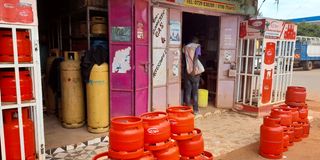Rising cooking gas prices a threat to forest cover, environmentalists warn

The price of LPG at a petrol station in Voi, Taita Taveta County. Residents are now shifting back to the use of biomass fuel due to the high prices of cooking gas.
Environmentalists in Taita Taveta County have warned that the increase in cooking gas prices will hamper efforts in protecting forests in the country.
This comes after the Kenya Revenue Authority (KRA) introduced Value Added Tax (VAT) on cooking gas on July 1, to boost revenue collection.
Since 2016, Liquefied Petroleum Gas, popularly known as cooking gas, has been retailing at costs that exclude VAT, after the government removed the 16 per cent tax that was imposed on the product.
However, the Finance Act 2020 re-introduced the VAT, but its implementation was postponed to the second half of 2021, due to the outbreak of the Covid-19 pandemic.
Speaking to Nation.Africa, the environmentalists said the high prices will increase the demand for biomass fuel sources, mainly charcoal and firewood thereby posing a threat to the sustainability of forests in the country.
They said the cost of alternative fuel for cooking such as gas is one of the challenges facing the collaborative efforts that are crucial in protecting trees in the area.
"The high prices are posing a threat to environmental conservation as the majority of residents will now go back to firewood as a source of fuel," said Mr Zaccheaus Maghanga, a Water Resources Users Association (Wrua) chairperson in Voi.
Mr Maghanga termed the situation as a major setback to forest conservation efforts.
He said among the mandate of the Wrua is to identify an alternative source of fuel for people living in catchment.
"That is captured in our sub-catchment plan but it is difficult to convince people to switch to the alternative energy because they cannot afford it," he said.
Mr Maghanga said several people have relocated to the villages after losing their jobs in towns following the outbreak of the Covid-19 pandemic.
"Raising the cost of cooking gas will make many families from poor households run to charcoal and firewood. This will cut down trees, thereby reducing the country's forest cover," he said.
According to the latest data from the Kenya National Bureau of Statistics (KNBS), out of 94,468 households in the county, only 14 per cent of the families are using LPG for cooking.

A container where the government's subsidised LPG was to be stored at Voi DCC's offices. The project was suspended in 2018.
The data shows that over 55 per cent of the households are using firewood while over 22 percent of families use charcoal for cooking.
Currently, Taita Taveta County has a tree cover of 3.6 per cent and stakeholders are working towards extending it to four per cent by next year.
Mwangea Tsavo Group chairperson, Mr Herbert Warombo said rural communities in the county had begun to slowly shift to the forest-friendly LPG, reducing their reliance on firewood, a major boost for habitat and wildlife conservation.
"Our ultimate goal is to save the country’s fast disappearing forest cover. We are still behind in terms of forest cover and that is why we have been fighting to have more people shifting to clean energy," he said.
He said the conservation group plans to plant over one million trees by the end of the next year 2022 and 10 million trees by 2028.
The trees will be planted along highways and around the Tsavo National Park.
Following the introduction of the VAT, cooking gas refills have increased at all distributors in the country.
A spot check at various petrol stations in Voi revealed that the cost of a 13 kg cooking gas cylinder ranges from Sh2,350-Sh2,500 up from Sh2,100 while a six-kilogramme cylinder is retailing at Sh1,200 up from Sh900.
Meanwhile, a bag of charcoal weighing 100-kilograms is being sold at Sh1,200 in Voi, attractive pricing compared to the cooking gas.
The situation has heavily impacted the budget of many households.
"In my household, a bag of 100 kg charcoal can last for over a month while the three-kilogramme gas cannot even go for one month," said Ms Angeline Wakio, a Voi resident.
Others have gone back to use kerosene which is currently retailing at Sh96 a litre.
"I have started using paraffin for both cooking and lighting. The advantage with paraffin is that one can buy in small quantities of Sh50 at local kiosks," Ms Wakio added.
Firewood extraction by communities has led to habitat degradation as well as health issues caused by toxic gases.
"We have been encouraging communities to switch to LPG but the prices are now a setback. Apart from saving trees, the usage of firewood is harmful due to toxic gases," said Ms Wabosha Kamata, an official at Taita Taveta Wildlife Conservancies Association (TTWCA).
She said the carbon credit business which is relied on by ranches will also be affected.
A plan by the government to migrate more than four million poor households to the cleaner LPG was suspended in 2018.
The project aimed at distributing over 4.3 million cylinders over three years to reduce the pressure of firewood extraction in forest habitats.
Ms Kamata urged the government to remove the tax rate to allow more households to switch from charcoal and kerosene to LPG.
She said apart from providing subsidised LPG, the government should create awareness in households for them to understand the harmful impacts of burning firewood, to ensure that the switch to LPG is sustained.
"Our leaders especially parliamentarians must ensure that such taxes are not imposed on important products," she said.





